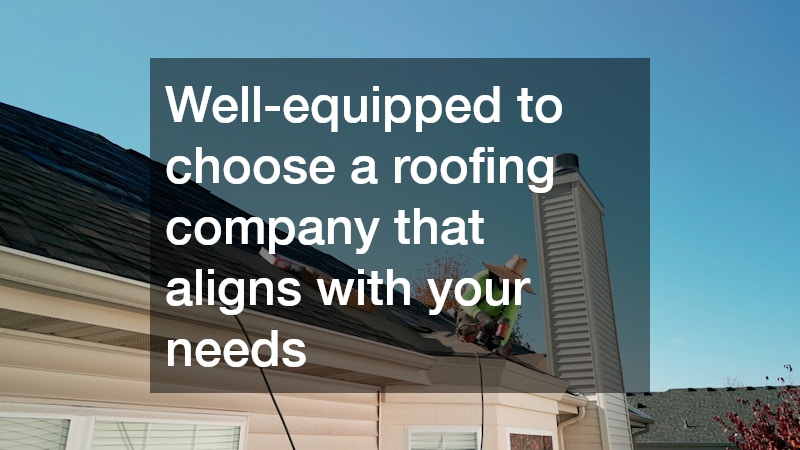When it comes to protecting your home, choosing the right roofing company is crucial for ensuring quality and reliability. A well-installed roof not only safeguards your family but also enhances your home’s aesthetic and resale value. This article provides expert tips to help you make an informed decision.
1. What to Look for in a Roofing Company?
Understanding the importance of vetting roofing companies for proper licensing and insurance is paramount. A licensed roofer ensures that the contractor is compliant with state regulations, which minimizes legal risks for both parties.
Additionally, insurance protects you from financial responsibility should an accident occur on your property, offering peace of mind that the project will be handled professionally.
Insurance can include general liability and workers’ compensation, both of which are crucial. Verifying this information beforehand helps avoid potential litigation. Remember, legitimate companies will not hesitate to provide proof of these credentials.
Ensure you ask to see these documents and verify their legitimacy through the issuing bodies. This step is non-negotiable when aiming to work with the best roofing professionals. Ultimately, comprehensive licensing and insurance form the foundation of a legally sound roofing project.
The years a company has been in business are often indicative of its ability to deliver quality work. Experienced companies have honed their skills and can provide expert advice on a variety of roofing materials. Such expertise ensures your home’s roof will be both durable and visually appealing.
Working with seasoned professionals mitigates risks associated with project delays and unaccomplished work. A good contractor will have a proven track record of successfully completed projects. Additionally, experienced companies can provide insights into innovative roofing solutions.
Assess their proficiency in handling specific types of roofs, whether asphalt shingles, metal roofing, or tiles. This expertise enhances the likelihood of a smoothly executed project. Consequently, the roofer’s experience plays a significant role in your satisfaction and long-term investment.
2. How to Evaluate Roofing Quotes and Estimates?
Evaluating quotes entails a clear understanding of the scope of work involved in your roofing project. A detailed outline of tasks ensures you can compare bids accurately by knowing exactly what’s being offered. This transparency prevents unexpected costs and misunderstandings down the line.
A thorough scope may include material specifications, timeline estimates, and labor requirements. A comprehensive description provides clarity for both parties, aligning expectations and responsibilities. This document also serves as a reference point should disputes arise during or after project completion.
Properly understanding the scope empowers you to hold contractors accountable. More than a financial safeguard, it reflects the company’s respect for clear communication and structured project management. Trust builds when both parties know the project’s intricacies.
Upon receiving multiple quotes, it’s essential to weigh pricing against the value offered. While costs are significant, they should not compromise the quality of materials or workmanship. Prioritize proposals that offer competitive pricing alongside durable materials and skilled labor.
Evaluating quotes based on value prevents future regrets related to poor workmanship or inferior materials. This consideration helps ensure your investment offers long-lasting protection. Ultimately, a balanced approach to costs and value provides optimal return on your roofing investment.
3. What Questions Should You Ask a Potential Roofing Contractor?
Inquiring about the project timeline and key milestones aids in setting mutual expectations. Reliable contractors will provide a clear schedule, highlighting major stages from start to completion. This knowledge enables you to plan around construction with minimal disruption to daily life.
An outlined timeline also serves as a benchmark for project progress and management. Address how unforeseen delays are communicated and handled to mitigate unexpected setbacks. Such clarity is vital in maintaining accountability throughout the project’s duration.
Determine how the contractor plans to handle unexpected challenges that may arise during your roofing project. Discuss potential issues such as weather disruptions, material shortages, or unforeseen structural damage. Knowing their mitigation strategies ensures preparedness and reduces stress should problems occur.
Inquire about their processes for communication and decision-making in unforeseen circumstances. A contractor who readily shares their problem-solving approach is likely to handle the unexpected with competence and efficiency. This can prevent delays and additional expenses, protecting your project timeline and budget.
Transparent dialogue about potential challenges enhances collaboration between you and the contractor. By asking pertinent questions, you secure an understanding of their capability in managing surprises. Ultimately, this understanding boosts confidence in a seamless, predictable project outcome.
By incorporating these expert tips, you’ll be well-equipped to choose a roofing company that aligns with your needs for quality and reliability. Thoughtful consideration of licensing, experience, and reviews helps lay a strong foundation for your decision. Evaluating quotes with a keen eye on value, warranties, and after-sales support ensures a well-protected investment.

